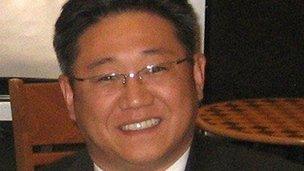North Korea sets out jailed American's 'crimes'
- Published

Kenneth Bae was arrested in November in Rason
North Korea has released details of the alleged crimes of a US man it sentenced to 15 years of hard labour.
Pae Jun-ho, known in the US as Kenneth Bae, smuggled anti-government materials and plotted the state's downfall, a Supreme Court spokesman told state news agency KCNA.
He denied Mr Bae was being used as a "political bargaining chip" with the US.
Mr Bae was detained last year after entering North Korea as a tourist.
North Korea has arrested several US citizens in recent years, including journalists and Christians accused of proselytism.
They were released after intervention from high-profile American figures, including former Presidents Bill Clinton and Jimmy Carter, both of whom went to Pyongyang.
'Smear campaign'
The court spokesman told KCNA that Mr Bae was "dispatched to China as a missionary".
There he was involved in setting up "plot-breeding bases" from which he "infiltrated at least 250 students" into the North Korean port city of Rason with the aim of "bringing the government down".
"He committed such hostile acts as egging on overseas [North Korean] citizens and foreigners to perpetrate hostile acts to bring down its government while conducting a malignant smear campaign," he said.
He added Mr Bae's full confession was the reason why he did not receive a possible death sentence.
"He dared commit such hideous crimes as hurting the dignity of the supreme leadership," he said.
The spokesman denied that Mr Bae was "not tried in a transparent matter and [the North] was trying to use this issue as a political bargaining chip".
Mr Bae, 44, was arrested in November as he entered Rason, a special economic zone near North Korea's border with China.
South Korea activists believe he was arrested for taking pictures of starving children. Other reports have described him as a devout Christian.
His conviction on 30 April came amid high tension between the US and North Korea, after Pyongyang's third nuclear test.
The UN expanded sanctions against the communist state in March, in the wake of its 12 February nuclear test and December long-range rocket launch.
Pyongyang reacted angrily both to the measures and the annual US-South Korea military exercises, threatening to attack US military bases and cutting key hotlines with its southern neighbour.